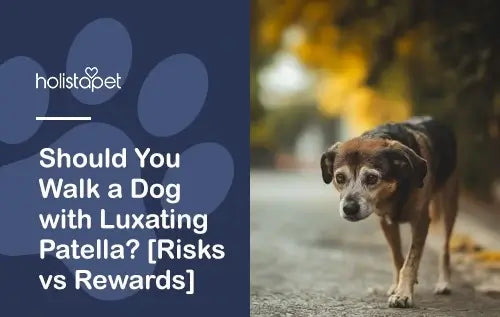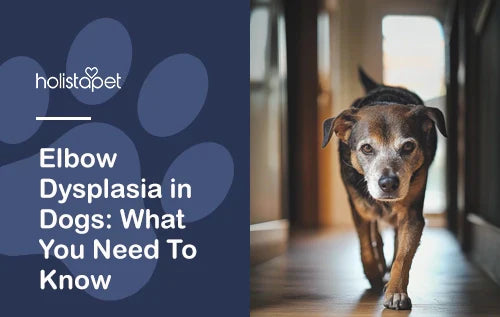Is your dog dragging their booty across the floor? It might look funny, but a dog scooting its butt can signal an underlying issue that needs attention. From pesky anal sac issues to simple hygiene mishaps, butt scooting is your furry friend's way of saying, "My bum's bugging!"
This post explains the most common reasons behind your pup's scooting antics. We'll also share practical solutions to keep their rear ends happy and healthy. Let's discuss the causes, health concerns, and ways to give your cherished companion the comfort they deserve!
Why Do Dogs Scoot on Their Butt?

Dogs scoot on their butt for one main reason: Something back there doesn't feel quite right! This scooting behavior is a dog's attempt to relieve discomfort or irritation around their rear ends. It's an important clue for pet owners to investigate what's causing the issue.
Scooting is your dog's way of flagging that something needs attention. By understanding the reasons behind this quirky behavior, you can take steps to help your pooch feel better and prevent future episodes.
Common Causes of Dog Scooting
Your dog dragging their butt around might look funny, but it usually points to a problem that needs fixing. Here are the most common causes of scooting in dogs:
- Full Anal Sacs. These tiny glands near your dog's anus can fill up and become uncomfortable, leading to excessive scooting.
- Intestinal Parasites. Worms like tapeworms can cause irritation around the anus, causing dogs to start scooting.
- Dirty Bottom. Stuck poop or debris around your dog's rear can cause discomfort, prompting them to scoot around.
- Skin Irritation. Allergies, clipper burns, or reactions to grooming products can lead to an itchy or tender anal area.
Health Concerns Related To Scooting
If your dog is scooting, it can point to underlying health issues that need attention. Here are some potential concerns to watch for:
- Anal Sac Infections. If your dog's anal sacs become impacted or infected, they may experience swelling, tenderness, and frequent scooting.
- Rectal Prolapse. In rare cases, excessive scooting can lead to or indicate a rectal prolapse. This happens when part of the rectum protrudes through the anus.
- Tissue Damage. Constant scooting can irritate the skin around the anus, leading to raw, painful spots that may become infected.
- Food Allergies. Allergies can cause inflammation and itchiness around your dog's anus, contributing to scooting behavior.
How to Comfort a Dog's Rear

When your pup's backside is causing them grief, they rely on you to make things better. Comforting them starts with identifying the source of their irritation or pain. Thankfully, there are plenty of ways to soothe their scooting woes. There's a solution for every dog, from cleaning up irritated areas to trying safe home remedies or even exploring full-body relief options.
Cleaning and Soothing Irritated Areas
A clean bottom is the first step to helping your dog feel better. Gentle cleaning, especially after your dog poops, can work wonders if they have a dirty bottom or irritated skin.
Use a soft cloth, warm water, and a mild pet-safe cleanser to clean around the anus. Check your dog's tail, too, for anything stuck. Apply just enough pressure (not too much!) to keep your pooch comfy during the process.
After cleaning, a warm compress can help soothe irritated skin. Hold a cloth soaked in warm water against the area for a few minutes to ease discomfort and reduce swelling. Your furry buddy will thank you for the TLC!
Safe Home Remedies for Relief
Home remedies can provide quick relief. One effective option: canned pumpkin. It can help improve your dog's stool quality and naturally support anal gland function. Add a small spoonful to your dog's meals and see the difference.
Another simple remedy is a warm compress. Gently press a warm, damp cloth to the area surrounding the anus. This will help soothe irritation and encourage the glands to drain naturally. Make sure your dog is comfortable during the process, and avoid using anything too hot or harsh on their sensitive skin.
CBD for Full-Body Comfort
CBD (cannabidiol) can be a game-changer for dogs with scooting issues. This natural remedy works with their internal system to promote balance and comfort.
HolistaPet's premium CBD dog products offer all-natural relief, promoting relaxation and overall wellness. From Crunchy CBD Treats to Soft Chews, Oil, and Capsules, there's a tasty option for every canine companion.
These goodies deliver broad-spectrum CBD paired with vegan-friendly, non-GMO ingredients. Each product is third-party lab tested to guarantee top-notch quality and effectiveness. With these options, you can help your furry buddy feel their best, even when scooting strikes.
When To See a Veterinarian for Dog Scooting

Sometimes, excessive butt scooting might call for professional help. If home remedies and cleaning don't resolve the issue, or if you notice other signs of discomfort, it's time to head to the vet's office. Your vet can identify the root cause and recommend the best course of action. Let's explore how to recognize when your dog's scooting needs extra attention.
Signs That Indicate a Serious Issue
While occasional scooting might not be a big deal, some signs suggest a more serious problem. Keep an eye out for the following:
- Swelling Around the Anus. Noticeable puffiness or redness can point to infected or impacted anal sacs.
- Constant Scooting. If your dog is scooting multiple times a day, it may indicate an ongoing issue needing professional care.
- Bloody or Unusual Stool. Changes in your pet's stool, like blood or mucus, can point to intestinal parasites or other health concerns.
- Visible Pain or Agitation. Whimpering, licking the anal area excessively, or reluctance to sit are signs your dog may be in discomfort.
Diagnostic Steps and Treatment Options
When your pet's scooting becomes a concern, a vet can help pinpoint the cause and provide targeted treatment. Here's what you can expect:
- Physical Examination. The vet will inspect your dog's anus, tail, and stool for signs of swelling, irritation, or infection.
- Anal Gland Expression. If full anal sacs are the issue, the vet may manually empty them to provide immediate relief.
- Stool Testing. They may request a stool sample to check for parasites or other abnormalities.
- Medications or Dietary Changes. Depending on the diagnosis, your vet might recommend antibiotics, anti-parasitic treatments, or dietary adjustments to address the root cause.
Preventing Dog Scooting in the Future
The best way to keep your dog scoot-free is by tackling the root causes before they become a problem. Preventive care, like proper grooming and a balanced diet, can make all the difference in your furry pal's comfort. Let's look at the simple steps you can take to help your fur baby avoid scooting in the future.
Proper Grooming and Hygiene Practices
Keeping your dog clean and well-groomed is key to preventing scooting. Here are a few easy practices to follow:
- Regular Backside Checks. Inspect your dog's bottom for any signs of dirt, swelling, or irritation, and address issues promptly.
- Baths with Gentle Products. Use mild, pet-safe shampoos to clean your dog, especially around sensitive areas like their rear.
- Keep Fur Trimmed. Long-haired dog breeds, like Shih Tzus, can benefit from trimmed fur around their anus to avoid matting or debris buildup.
- Monitor After Bathroom Breaks. Check your dog's bottom for stuck poop or dirt, and clean gently with warm (not hot) water if needed.
Diet and Supplements for Anal Gland Health
A well-rounded diet helps keep your pet's bottom in check. Fiber-rich and gut-supportive foods may improve stool quality, making it easier for them to naturally empty their glands. Also, make sure your dog stays hydrated for better digestion and gland function.
At HolistaPet, we offer dog-specific wellness products your pooch will love. These goodies may help maintain healthy anal glands while keeping your dog happy and comfy:
- Dog Probiotic Soft Chews. These chews promote a healthy gut microbiome, helping improve digestion and stool consistency.
- CBD for Dogs. Packed with omega fatty acids from hemp seed oil, these products may help ease swelling and irritation back there.
- Multivitamin Soft Chews and Immune Support Soft Chews. These treats include omega fatty acids that promote gland health by helping improve stool quality and regularity.
Keeping your canine bestie scoot-free is all about staying proactive with hygiene, diet, and a little extra TLC. By addressing the causes and knowing when to seek help, you can keep their tail wagging happily all day, every day. Remember, a healthy rear means a happier, more comfortable pooch. No more dragging across the floor!
Want to continue learning? Browse more dog care blogs here.







![Probiotics For Dogs [Soft Chews] - HolistaPet](http://www.holistapet.com/cdn/shop/files/Probiotic-Infographic-1_472d7a29-e30c-435a-9638-1365d8c3a9f9.jpg?v=1725384841&width=104)



























Leave a comment
All comments are moderated before being published.
This site is protected by hCaptcha and the hCaptcha Privacy Policy and Terms of Service apply.